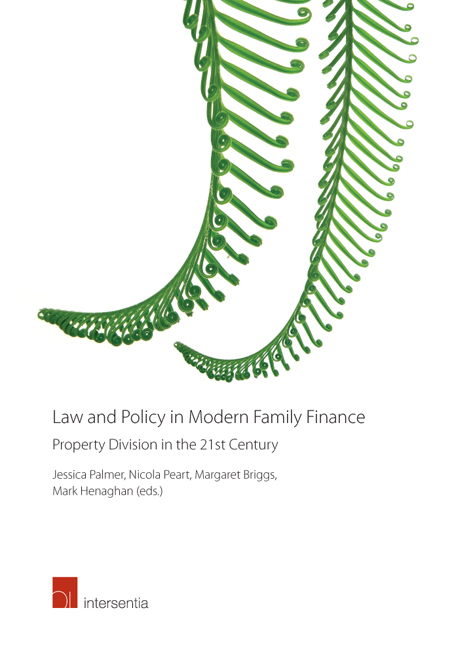Book contents
- Frontmatter
- Foreword
- Acknowledgements
- Contents
- Table of Cases
- List of Contributors
- Chapter 1 Introduction
- PART I WHO SHOULD BE COVERED BY A PROPERTY SHARING REGIME?
- Chapter 2 Reconsidering Family Property Law in the Post-Marital Age
- Chapter 3 Which Relationships Should be Included in a Property Sharing Scheme?
- Chapter 4 Children's Interests in Division of Property on Relationship Breakdown
- Chapter 5 Family Finances on Death of a Spouse or Partner
- Chapter 6 A Lament for ‘Testator's Family Maintenance’ – A Good Idea Gone Wrong? Australian Reflections
- PART II WHAT PROPERTY SHOULD BE COVERED BY A PROPERTY SHARING REGIME?
- PART III HOW SHOULD PROPERTY BE SHARED AT THE END OF A RELATIONSHIP?
- Index
Chapter 2 - Reconsidering Family Property Law in the Post-Marital Age
from PART I - WHO SHOULD BE COVERED BY A PROPERTY SHARING REGIME?
Published online by Cambridge University Press: 29 September 2018
- Frontmatter
- Foreword
- Acknowledgements
- Contents
- Table of Cases
- List of Contributors
- Chapter 1 Introduction
- PART I WHO SHOULD BE COVERED BY A PROPERTY SHARING REGIME?
- Chapter 2 Reconsidering Family Property Law in the Post-Marital Age
- Chapter 3 Which Relationships Should be Included in a Property Sharing Scheme?
- Chapter 4 Children's Interests in Division of Property on Relationship Breakdown
- Chapter 5 Family Finances on Death of a Spouse or Partner
- Chapter 6 A Lament for ‘Testator's Family Maintenance’ – A Good Idea Gone Wrong? Australian Reflections
- PART II WHAT PROPERTY SHOULD BE COVERED BY A PROPERTY SHARING REGIME?
- PART III HOW SHOULD PROPERTY BE SHARED AT THE END OF A RELATIONSHIP?
- Index
Summary
INTRODUCTION
The last 40 years or so have seen massive changes in family life in many post-Christian countries. Marriage is no longer the only accepted basis for family formation and, indeed, in many countries more children are born outside of marriage than within it. Ours is, to some extent, a post-marital age. What kinds of relationships, then, should be covered in default rules for property division if the relationship breaks down? These issues are explored through three vignettes:
– Cameron and Sandra are in their mid-20s and are contemplating if and how to formalise their relationship.
– Amir, a refugee from Afghanistan, is married to Sanaubar. They have three children together. He takes a second (de facto) wife, Basira, and they also have a child together. The relationship with Basira does not last.
– Melissa has had a succession of relationships, including a failed marriage. She gains sole ownership of the former matrimonial home in the divorce. Then she lives with Jim for over five years in an intimate domestic relationship; but neither want to marry. Finances are kept separate.
In the light of these vignettes, consideration is given to whether dyadic Judaeo-Christian marriage can remain the paradigm for a default law of property division on separation.
THE EMERGENCE OF THE POST-MARITAL AGE
The last 40 years have seen very rapid social change, especially in terms of family life and moral values about sexual behaviour in Western countries. New Zealand, it seems, is no exception to the patterns of change in post-Christian societies.
The idea that many of these societies could actually be post-marital societies, as well as post-Christian societies, may at first be confronting. Marriage still remains reasonably popular as a basis for a long-term commitment amongst university-educated people in Western countries. It remains obligatory as the basis for family life in deeply religious communities. For many in the lesbian, bisexual, gay and transgender (LBGT) communities, achieving legal recognition of their relationships as marriages has been a fervently sought goal.
However, as university-educated people moving in professional circles, we need to resist the temptation to see the world around us through the coloured glasses of those with whom we associate. For a large proportion of the population in Western societies, marriage is no longer seen as the conventional norm for founding a family.
- Type
- Chapter
- Information
- Law and Policy in Modern Family FinanceProperty Division in the 21st Century, pp. 15 - 36Publisher: IntersentiaPrint publication year: 2017
- 1
- Cited by

